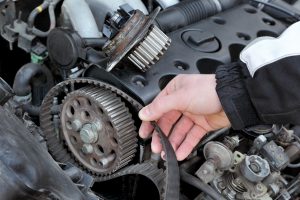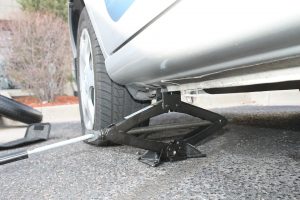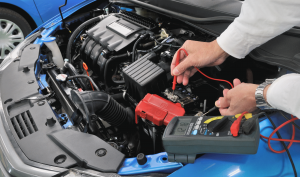Performing DIY repairs and maintenance on your vehicle can save you a lot of money. However, it can be dangerous if you don’t know what you are doing. The following tips are used by mechanics to stay safe while on the job.
1. Always make sure that the vehicle is not going to move while you are working on it.
A non-stationery vehicle is dangerous to work on because it can move unpredictably. This can be particularly hazardous if you are under the vehicle. When you are preparing to work on a vehicle, you should always check that the parking brake is engaged and that the vehicle is set to park (automatic) or neutral (manual).
2. Beware of high engine temperatures.
A car’s engine generates a lot of heat when it is running. Don’t attempt to adjust or remove any parts of your vehicle’s engine assembly while the engine is running. Also wait until the engine cools before trying to perform cooling system or oil maintenance work, to prevent scalding fluids burning you.
3. Beware of other under-the-hood components.

Always let the vehicle cool down before removing the radiator cap. The coolant is kept at pressures of up to 15 psi, meaning that if you remove the cap while the vehicle is still warm, you could get sprayed with boiling hot coolant. In general, you should wait at least 45 minutes to an hour to remove the radiator cap. Always use a rag to slowly remove the cap.
If you want to keep your fingers intact, we recommend that you keep them away from the vehicle’s fans, chains and belts while the engine is running. These components operate at high speeds and should only be examined while the engine is off.
If the vehicle you are working on has a cooling fan, beware that it can keep spinning for up to 15 minutes after the engine has been turned off. If you need to work near the cooling fan, be sure to either pull the fuse or wait until it has come to a complete stop.
4. Avoid fires in your garage.
Petrol is very flammable, even in small amounts. Try to avoid spillages of petrol in your workshop or garage. Always keep a fire extinguisher nearby and educate yourself on how to use it in the event of a fire.
Never smoke in your workshop. If an ash or ember from your cigarette makes contact with petrol, you could be in a lot of trouble. If you smoke, we recommend that you do it far way from the vehicle you are working on.
If part of your work involves welding or anything else that creates sparks, we suggest that perform these activities far away from the vehicle(s) you are working on. Always keep an eye out for fire hazards. These can include petrol / oil-soaked rags, puddles of fuel or other flammable chemicals or additives.
5. Learn how to jack a vehicle safely.

Make sure that the wheels are properly secured when jacking a vehicle. Use bricks or planks of wood to act as wedges to keep the non-jacked wheels from rolling. As mentioned above, always engage the parking brake and put the vehicle in park/neutral, especially when raising it from the ground.
Find the factory-recommended jacking point(s) and use these to lift the vehicle. The location of the jacking points can be found in the vehicle’s manual or with the jack and tools. Once the vehicle is raised, very carefully lightly shake the vehicle (while everyone is clear of the vehicle) to make sure that it is stable.
6. Beware of hazardous chemicals.
Coolant, cleaners and other vehicle additives are toxic. Avoid touching your mouth, nose or eyes after handling these chemicals. When you have finished with these chemicals, wash your hands thoroughly. If you have children, keep these chemicals in a high place that they can’t reach.
Brake pad dust can be hazardous to your lungs. Therefore, we recommend wearing a disposable mask when replacing or working on brake pads. Use brake pad cleaner and a vacuum to safely and efficiently remove the dust from your brakes and tyres.
Used motor oil can be hazardous to your skin, especially after prolonged exposure. We recommend using gloves when performing an oil change on a vehicle. If you get oil on your skin, wash it off as soon as you can.
7. Take precautions when working with electricity.

Combining metal tools with electrical components can result in a short circuits. We suggest that when working with the starter motor, alternator or any other electrical component, you should use properly insulated tools.
When removing a battery, always remove the negative (or ground) terminal first. This will prevent the transfer of energy to the vehicle’s body and frame.
At Grimmer Motors, our qualified, experienced and trusted mechanics are happy to safely perform maintenance or repairs on your vehicle for you. If you want your vehicle repaired, or just want to talk about the status of your vehicle, free to book an appointment with us.

